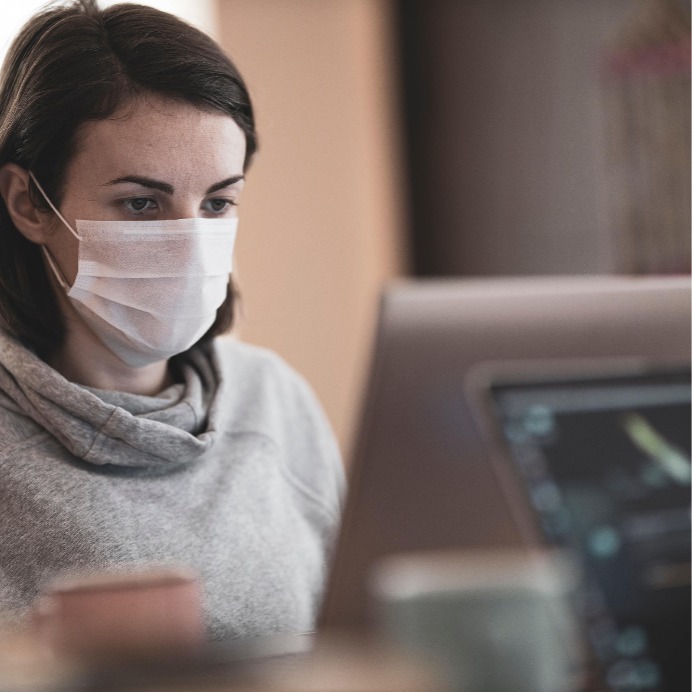Individuals diagnosed with cancer have been identified as being at a high-risk of getting seriously ill if they get COVID-19. Data from various studies show that the type of cancer, the stage, the person’s age, health, and other factors contribute to how high-risk a patient may be. In addition to this, the type of treatment a person is receiving and how long their last treatment was, can all impact their outcome. At the same time, a few studies have shown that breast cancer patients fare better, compared to patients with other types of cancers.
These studies on the risk of breast cancer patients contracting COVID-19 are very limited and are also based on very low participant numbers. This means that it is hard to properly assess one’s risk level. In order to ease the burden on hospitals and to protect vulnerable populations, many cancer centres have had to change their standard of care and find ways to balance a patient’s cancer diagnosis with their risk of contracting COVID-19 and facing further complications. This has involved delaying some surgeries and cancer treatments, which can lead to understandable uncertainty and anxiety. CBCN has written this blog to ease some concerns that you might have as a breast cancer patient regarding treatments/surgeries being postponed. We provide data from studies that have investigated the impact of treatments/surgeries on a person’s immune system, how long certain procedures can be delayed, and which procedures can be safely substituted for another type of procedure. This is not an exhaustive list as it only contains information that is available currently.
Effect of Breast Cancer Surgery/Treatment on Immune System
-
For metastatic patients on endocrine (hormonal) therapies, oral treatments such as tamoxifen or aromatase inhibitors should not affect the immune system
-
For patients with HER2-positive breast cancer, trastuzumab (+/- pertuzumab) can be used in both a neoadjuvant or adjuvant setting, and trastuzumab-emtansine in the adjuvant setting, with less immunosuppression*
Delays and Substitutes for Breast Cancer Surgery/Treatment
By breast cancer type:
-
ER-positive/HER2-negative breast cancer
-
Neoadjuvant (or bridging) endocrine therapy (mostly tamoxifen) is an option that allows surgery to be deferred by 6 to 12 months*
-
If chemotherapy is indicated, it can be administered in an neoadjuvant (preoperative) setting*
-
Neoadjuvant endocrine therapy makes it possible for a short-term delay of definitive surgery
-
-
HER2-positive breast cancer
-
For those with other comorbidities who are also elderly, or with very low risk cancers, adjuvant anti-HER2 therapy (trastuzumab) may be stopped after 6 months instead of 12 months*
-
Trastuzumab, pertuzumab, and related antibody-drug conjugates can be administered at less frequent dosing intervals
-
-
Ductal carcinoma in situ
-
Surgery can be delayed from 6 to 8 weeks and up to 3 months (if it’s at a low or intermediate grade)
-
-
Low-intermediate grade tumors, lobular BCs, low-risk genomic assays or “luminal A” signatures
-
There is no substantial benefit from neoadjuvant or adjuvant chemotherapy so they can get endocrine therapy alone*
-
By breast cancer treatment/surgery:
-
Chemotherapy
-
For metastatic disease, oral treatments can sometimes be used**
-
These may still suppress immune function however
-
-
Ovarian function suppression (LHRH agonist injections) can be given every 3 months instead of monthly and can sometimes be administered at home by trained nurses**
-
For neoadjuvant chemotherapy, delaying surgery for up to 8 weeks after chemotherapy may not negatively impact survival
-
-
Adjuvant radiation
-
For those with other comorbidities and for postmenopausal women, radiation therapy can be delayed from 3 to 6 months*
-
Radiation does not suppress the immune system and can be given safely “on time” if Covid-19 is not endemic at a cancer centre
-
Outcomes from delaying radiation therapy for 20 weeks after breast-conserving surgery is comparable to delaying it for 4 to 8 weeks *
-
-
Radiation Therapy
-
Can sometimes be given before adjuvant chemotherapy without negatively impacting survival (especially for ER-positive, HER2- negative breast cancer)
-
* Report specifically mentions early stage patients
** Report specifically mentions metastatic patients
Photo by Emma Matthews Digital Content Production on Unsplash








